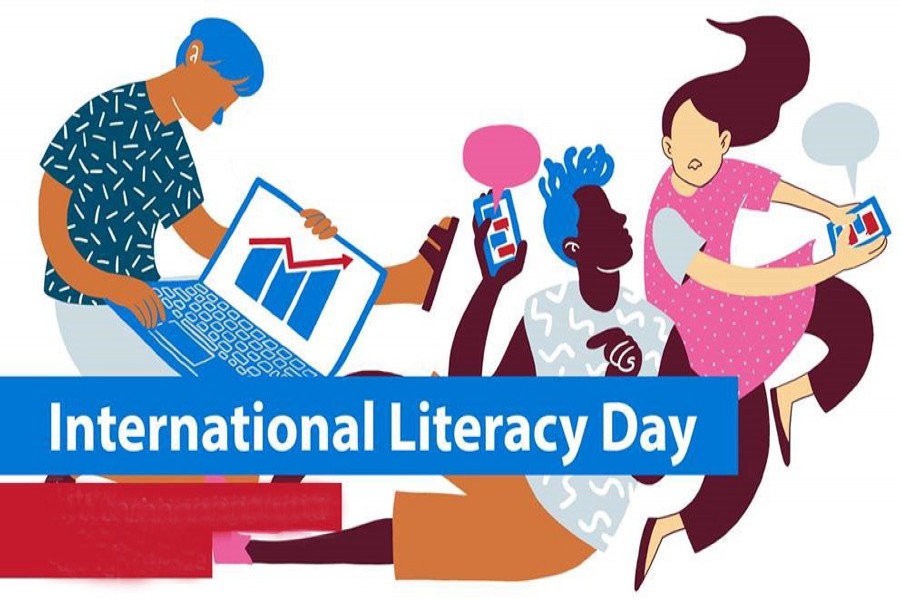The theme of the International Literacy Day this year is: `Literacy in a Digital World'. The decision to celebrate a day highlighting literacy was taken at the meeting of education ministers in Tehran on September 8 in 1965. The member countries of the United Nations began observing the day from 1966. Elaborate programmes are organised by the government, teachers' unions and non-govt. organisations in Bangladesh to mark the Day. At a press conference the Primary and Mass Education Minister mentioned that the literacy rate in Bangladesh stood at 72.3 per cent.
The United Nations Educational, Scientific and Cultural Organisation (UNESCO) defines literacy as the "ability to identify, understand, interpret, create, communicate and compute using printed and written materials associated with varying contexts. Literacy involves a continuum of learning enabling individuals to achieve their goals, broaden their knowledge and potential and participate fully in their community and wider society"
Over the past several decades, global literacy rates have significantly increased. The main reasons for such an upward trend are the evolution of the educational system in many developing countries and an increased acknowledgement of the importance of education in their societies. Still, many nations are struggling with the provision of educational resources to better their populaces, building the necessary infrastructure it requires and ensuring regular enrolment of students at their schools. Nonetheless, even those countries lagging well behind global norms realise how necessary it is to supply high quality education to the masses in order to compete and succeed in the global market again. To mention a sad part of literacy achievements, only 6.0 per cent of adults in the poorest countries, and less than 1.0 per cent in Bangladesh have ever attended literacy programmes, according to GEM Report published last year. It further says that Bangladesh is expected to achieve universal primary education in 2055 and universal lower secondary education in 2075 while universal upper secondary education not until the next century, The GEM report showed the potential for education to propel progress towards all global goals outlined in the new 2030 Agenda for Sustainable Development (SDGs).
The International Literacy Day celebration takes place on a specific theme of the year since 2006 in order to make it effective by executing some strategic plans to resolve the problems related to illiteracy all over the world in many countries. The theme for 2006 was "Literacy sustains development" to focus on achieving social progress. The theme for 2007 and 2008 was "Literacy and Health" to focus on literacy and epidemics (communicable diseases like HIV, Tuberculosis, Malaria, etc). The theme for 2009-2010 was "Literacy and Empowerment" to focus on gender equality and empowering women. The theme for 2011-2012 was "Literacy and Peace" to focus on importance of literacy for peace. The theme for 2013 was "Literacy's for the 21st Century" to promote global literacy. The theme for 2014 was "Literacy and Sustainable Development" to promote sustainable development in the areas of social development, economic growth and environmental integration. The theme for 2015 was "Literacy and Sustainable Societies". Last year in 2016 the theme was: 'Know the Past, Build the Future'
On the occasion of the International Literacy Day 2017, UNESCO Director General Ms Irina Bokova has said information and communication technologies are creating opportunities to address this challenge. Digital tools can help expand access to learning and improve its quality. They have the power to reach the unreached, improve the monitoring of literacy progress, facilitate skills assessment and make the management and governance of skills delivery systems more efficient. To create and seize new opportunities to take forward Sustainable Development Goal 4 on Education and lifelong learning for all, we need collective action. Partnerships between governments, civil society and the private sector are essential today to promote literacy in a digital world. We need to advance the global agenda and support national literacy initiatives.
The International Literacy Day offers a moment to review the progress and come together to tackle the challenges ahead. This year, the event is devoted to better understand the type of literacy required in a digital world to build more inclusive, equitable and sustainable societies. Everyone should be able to make the most of the benefits of the new digital age, for human rights, for dialogue and exchange, for more sustainable development. For that all concerned with education are to engage in concerted efforts. They include the govt, the policy makers and, above all, the teachers who will bring changes effectively. There may be a gap and controversies about the percentage of literacy and orientation. But we should get used to stressing less on rhetorics and polemics and emphasise more on actual work on the basis of commitment and appropriate planning to achieve literacy for all, from the young learners to the aged and the adults. After all, development touches and concerns all and through all.
Prof. Quazi Faruque Ahmed is a member of National Education Policy Committee and Chairman of the Initiative for Human Development (IHD). Email: [email protected]


